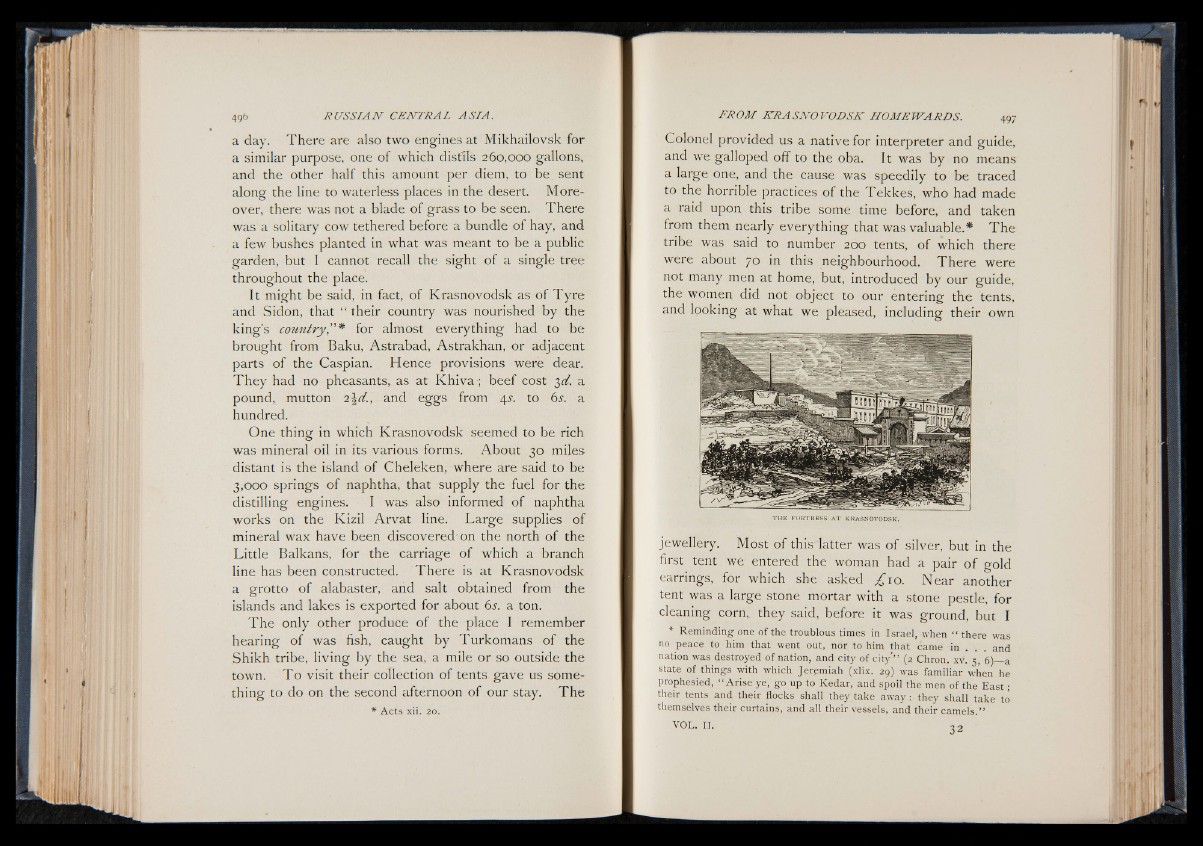
a day. There are also two engines at Mikhailovsk for
a similar purpose, one of which distils 260,000 gallons,
and the other half this amount per diem, to be sent
along the line to waterless places in the desert. Moreover,
there was not a blade of grass to be seen. There
was a solitary cow tethered before a bundle of hay, and
a few bushes planted in what was meant to be a public
garden, but I cannot recall the sight of a single tree
throughout the place.
It might be said, in fact, of Krasnovodsk as of Tyre
and Sidon, that “ their country was nourished by the
king's country,” * for almost everything had to be
brought from Baku, Astrabad, Astrakhan, or adjacent
parts of the Caspian. Hence provisions were dear.
They had no pheasants, as at K h iv a ; beef cost 3d. a
pound, mutton 2 \d., and eggs from 4^. to 6s. a
hundred.
One thing in which Krasnovodsk seemed to be rich
was mineral oil in its various forms. About 30 miles
distant is the island of Cheleken, where are said to be
3,000 springs of naphtha, that supply the fuel for the
distilling engines. I was also informed of naphtha
works on the Kizil Arvat line. Large supplies of
mineral wax have been discovered'on the north of the
Little Balkans, for the carriage of which a branch
line has been constructed. There is at Krasnovodsk
a grotto of alabaster, and salt obtained from the
islands and lakes is exported for about 6s. a ton.
The only other produce of the place I remember
hearing of was fish, caught by Turkomans of the
Shikh tribe, living by the sea, a mile or so outside the
town. T o visit their collection of tents gave us something
to do on the second afternoon of our stay. The
* Acts xii. 20.
Colonel provided us a native for interpreter and guide,
and we galloped off to the oba. It was by no means
a large one, and the cause was speedily to be traced
to the horrible practices of the Tekkes, who had made
a raid upon this tribe some time before, and taken
from them nearly everything that was valuable.* The
tribe was said to number 200 tents, of which there
were about 70 in this neighbourhood. There were
not many men at home, but, introduced by our guide,
the women did not object to our entering the tents,
and looking at what we pleased, including their own
TH E FORTRESS A T KRASNOVODSK.
jewellery. Most of this latter was of silver, but in the
first tent we entered the woman had a pair o f gold
earrings, for which she asked ¿ 10 . Near another
tent was a large stone mortar with a stone pestle, for
cleaning corn, they said, before it was ground, but I
* Reminding one of the troublous times in Israel, when “ there was
no peace to him that went out, nor to him that came in and
nation was destroyed of nation, and city of city'” (2 Chron. xv. 5, 6) a
state of things with which Jeremiah (xlix. 29) was familiar when he
prophesied, “ Arise ye, go up to Kedar, and spoil the men of the E a s t ;
their tents and their flocks shall they take aw a y : they shall take to
themselves their curtains, and all their vessels, and their camels.”
VOL. II. , 2